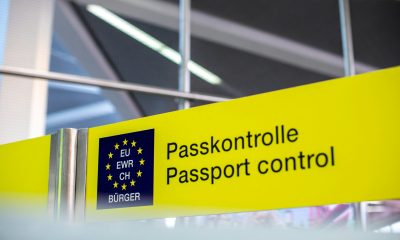EU
#EAPM - Comhdhálacha, ailse, agus eolas faoi thriail chliniciúil (nó easpa é)

 As you will probably already know, registration is open for EAPM’s upcoming conference (24 March, Brussels) which will be focused on our key theme of bringing innovation into Europe’s health-care systems, scríobhann Chomhghuaillíocht Eorpach do Pearsanta Leigheas (EAPM) Stiúrthóir Feidhmiúcháin Denis Horgan.
As you will probably already know, registration is open for EAPM’s upcoming conference (24 March, Brussels) which will be focused on our key theme of bringing innovation into Europe’s health-care systems, scríobhann Chomhghuaillíocht Eorpach do Pearsanta Leigheas (EAPM) Stiúrthóir Feidhmiúcháin Denis Horgan.
Seo an nasc le clárú, mar áis duit as well as please see link to the clár oibre.
This year’s annual conference - our 8th, plus three Congresses - will take place under the auspices of Croatia’s Presidency of the EU, which began in January, and will be the first in a series of three (more of which later).
The conferences reflect the current and incoming policies in the healthcare arena, but will also act as major events during what will be the first full year of the two new legislative bodies - the European Parliament and the European Commission.
As you know, for some years, now, EAPM has been in the vanguard of driving forward the concept of personalised medicine in Europe and beyond, with a special focus on bringing innovation into the health-care arena.
With its broad base of stakeholders, drawn from industry, academia, science, research, healthcare professions, patient groups, policymakers and more, the Alliance brings together key motivated and expert personnel from a wide range of EU member states.
The Presidency Conference held during the Croatia Presidency of the EU will have the title ‘Defining the health-care ecosystem to determine value’ and take into account that the presidency has highlighted as priorities a Europe that is growing and developing, a Europe that connects economically, energy-wise and infrastructure-wise, a Europe that protects and a Europe that is globally influential.
Regarding the EAPM event, the opportunity undoubtedly exists to re-align priorities to evaluate the needs of patients, health-care professionals and health systems to facilitate improved and safer therapies.
Tá spás agus riachtanas ann freisin do chomhoibriú feabhsaithe idir grúpaí rialála agus íocóirí an AE. Is é an aidhm a bheadh leis seo croíthorthaí seachas marthanas a aithint ar féidir iad a ionchorprú i dtrialacha, chomh maith le córais chúraim sláinte, chun sonraí a ghiniúint ar feadh saolré.
Meanwhile, value measures used for health policy must comply with the criteria for accountability for reasonableness. These represent the ethical gold-standard for a fair priority-setting process in public policy.
Availability and accessibility should be prioritised as patients are the key contributors to generating the data necessary for decision making. These patients should benefit from their contributions.
We need to look at:
- How Europe reconcile rapid access to innovation while incentivising necessary continued research to demonstrating value and societal benefits of new medical products, including IVDs
- The differences that affect regulatory vs payer decisions
- Specific data elements that would allow for efficient assessment of products providing significant benefit to patients
- Finding an agreed European (and possibly global) approach to quantifying clinical benefit
- Clinical outcomes other than survival that can be agreed upon to be used in registration trials and healthcare systems
- Whether all low-benefit medications need to be be licensed?
- And how to best explain the need for both clinical research and ongoing data collection to patients and society and its benefit to both
EAPM’s Croatia Presidency conference will pull together leading experts in the arena of personalised medicine drawn from patient groups, payers, healthcare professionals plus industry, science, academic and research representatives.
Also present will be legislators and policymakers in the form of health attachés, MEPs and Commission officials. The aim of the conference is to set the agenda for European healthcare during the next five years of EU legislation. Hopefully, we’ll see you there!
After this conference, EAPM will later hold a bridging event between the Croatia and German presidencies, followed by a Germany event towards the end of 2020.
Na bearnaí a líonadh
The bridging conference goes under the title ‘Maintaining public trust in use of Big Data for health science’ and will be held in Brussels on 30 June.
It will take into account that personalised health care brings us the opportunity to put citizens at the heart of decision making, including communicating openly about what happens to data, who is using it, and what level of control people can, or cannot, expect.
Generally speaking, one of the great challenges to reduce both late-stage incidence and mortality is early diagnosis. But it has to be reliable. In this conference that bridges two presidencies of the EU (Croatia and Germany), the emphasis is on public trust in health data and its uses.
One of the great opportunities to reduce both late stage incidence and mortality is early diagnosis. But it has to be reliable.
Following up, the German Presidency Conference will have the title ‘Building a decentralised, data-rich biomarker space to speed better cancer care’ and will take place from 17-18 November.
Looking ahead to the next two decades, there will be a massive increase in cases of cancer in Europe.
Regulators, industry and healthcare professionals really need to step up to this new reality, and this also applies to citizens, who have a certain degree of responsibility for their own health care.
Lifestyle changes will be paramount, and could amount in many cases to the best form of prevention.
Currently we’re churning out lots of data, but as more clinical trials and large scale epidemiological studies take place, new technologies such as blockchain will be urgently needed to handle the data.
And this has to be done without infringing regulations surrounding data protection (namely the General Data Protection Regulation).
Unfortunately, the barriers in respect of data sharing mean that risks related to data security and privacy can have a paralysing effect on progress.
Healthcare news from around Europe
European moves on cancer
We all know at least something about Plean Ailse Beating na hEorpa, but a survey for the general public to offer their views on the plan has suffered somewhat from technical issues, with one version going out later and others later still.
The result is that the deadline for filing it in is set to be extended beyond 28 April.
Meanwhile, in contrast, the launch of the consultation actually finished 30 minutes early. Possibly a record, as any EU-based journalist will tell you.
Health Commissioner Stella Kyriakides was at the gig and told the assembled that: “We have heard many say that maybe we are aiming too high, that maybe we will disappoint.
“Yes, this is an ambitious plan, but now is the time to be ambitious.”
At the same time she promised EU cash for the plan, saying “there will be money invested into the actions of this plan”.
The health commissioner was less forthcoming in respect of a question asking how Brussels will use tobacco and alcohol taxes to cut exposure to carcinogens. Is it a national competence?
The launch event was held in the European Parliament, and co-hosted by French MEP Véronique Trillet-Lenoir of the Renew Europe party. She’s a trained oncologist and we’ll all be hearing plenty from her on health care going forward.
Coincidentally (or not), Véronique’s mother-country’s health ministry plans to focus on ‘the before and after’ of cancer diagnosis. A ministry press release recently highlighted prevention as a key challenge among others, adding that it also wants to boost research into lung, pancreatic and paediatric cancers, plus leukemias with low survival rates.
France’s 10-year strategy will be adopted this year.
Bit of a trial for EMA
It seems that the EMA has been having trouble contacting clinical trial sponsors who had failed to report their trial results. Unbeknown to many, sponsors have one year to comply after completing a clinical trial (six months if it’s a paediatric trial).
Fortunately, the EMA has seen an improvement in reports from non-commercial sponsors, but this hasn’t been helped by the agency receiving thousands of “delivery failure” emails in December, due to changes in contact details (like any other large email database, really, there will eventually be lots of ‘bounce backs’).
Agus ar deireadh ...
Brexit. Of course.
It turns out that health and cooperation on medicines will not be a top priority during the upcoming EU-UK discussions under the Withdrawal Agreement between March and the end of the year.
The European Commission’s draft negotiating directives fail to mention medicines or medical devices as important sectors.
However, the EU is looking for a deal on intellectual property, important to pharmaceutical companies of course, plus regulatory cooperation.
Feicfimid…
Comhroinn an t-alt seo:
-

 CoinbhleachtaíLá ó shin 3
CoinbhleachtaíLá ó shin 3Céimeanna an Chasacstáin i: Idirscaradh na hAirméine-Asarbaiseáin
-

 An tAcht um Sheirbhísí DigiteachaLá ó shin 5
An tAcht um Sheirbhísí DigiteachaLá ó shin 5Beartaíonn an Coimisiún i gcoinne Meta maidir le sáruithe féideartha ar an Acht um Sheirbhísí Digiteacha
-

 MéadúLá ó shin 4
MéadúLá ó shin 4Cuimhníonn AE ar an dóchas a bhí ann 20 bliain ó shin, nuair a tháinig 10 dtír isteach
-

 Covid-19Lá ó shin 3
Covid-19Lá ó shin 3Ardchosaint ar Ghníomhairí Bitheolaíochta: Rath na hIodáile ARES BBM - Masc Bacainn Bitheolaíochta























